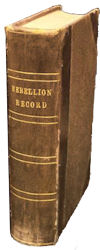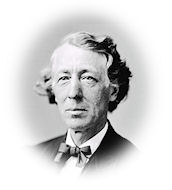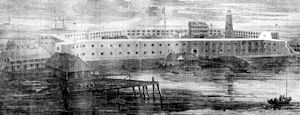HEADQUARTERS FORT JEFFERSON, TORTUGAS,
January 23, 1861.
SIR: I have the honor to report for the information of the General-in-Chief that I found on my arrival here, notwithstanding the energetic, well-directed, and highly-commendable efforts of Captain Meigs, the Engineer in charge, that Fort Jefferson could not be successfully defended from a judiciously-planned and concerted attack with a formidable force without having each front of the work and each bastion armed with artillery.
By the advice of Captain Meigs I dispatched the steamer Joseph Whitney, with Captain Meigs, Engineers, and Lieutenant Benson, Second Artillery, to Key West, where there is an abundance of guns and munitions, with a letter to Captain Brannan, commanding Fort Taylor, directing him to confer with Captain Meigs, and to send me such guns, &c., as Captain Meigs might deem necessary for the immediate defense of Fort Jefferson, in order that the honor of the Government and the defense of both forts might be maintained.
I am happy to report that Captain Meigs has returned from Key West in the steamer Joseph Whitney with six 8-inch columbiads and four field pieces and an ample supply of ammunition, which, with the two field pieces I brought from Fort Independence, will enable me as soon as they are in position to make a strong defense, most probably to hold this important position–the key of the Gulf–against any force that is likely to be brought against it.
I herewith inclose a copy of Captain Meigs’ report, and I will here take occasion to express my high sense of the services of Captain Meigs to render this fort defensible.
I am, very respectfully, your most obedient servant,
L. G. ARNOLD,
Brevet Major, U. S. Army, Commanding.
Lieut. Col. L. THOMAS,
Asst. Adj. Gen., U.S. Army, Headquarters Army, New York City.

[Inclosure.]

ENGINEER OFFICE, FORT JEFFERSON,
Harbor of Tortugas, U.S., January 23, 1861.
SIR: I have to report that I returned this morning on board the steamer Joseph Whitney, towing the Horace Beale, loaded with guns and ammunition, which I obtained from Fort Taylor. Lieutenant Benson, in whose charge you had placed the steamer, rendered me valuable assistance in embarking the heavy materials. Captain Maffit, of the U.S. steamer Crusader, to guard against every possible contingency, kindly convoyed us from Key West.
I recommend that one 8-inch columbiad be placed in the first right-curtain casemate on the right and left of bastions A, C, and E; one flanking gun in the casemate next the curtains in each bastion.
The artillerymen will be able to disembark and transport the guns and ammunition, and from the laborers of the Engineer Department all needful manual aid will be afforded. Two mules belonging to the Engineer Department are also at your service, if useful. A casemate gun and sling cart are on board the brigantine. A truck and wheelbarrow are in the Engineers’ park. The guns, I believe, can all be in place by to-night.
The Mohawk, which at my request came here on our arrival at Key West, will, I doubt not, if you desire it, remain here until the guns are in place; after which it would hardly be necessary to detain her, so far as the safety of this work is concerned, if she has other duties of importance to look after. Her presence, however, would, if she is not urgently needed elsewhere, be only a prudent and proper precaution.
I am, very respectfully and truly, your obedient servant,
M. C. MEIGS,
Captain, Engineers, Eng. in charge of Fort Jefferson.
Maj. L. G. ARNOLD,
Commanding Fort Jefferson.









